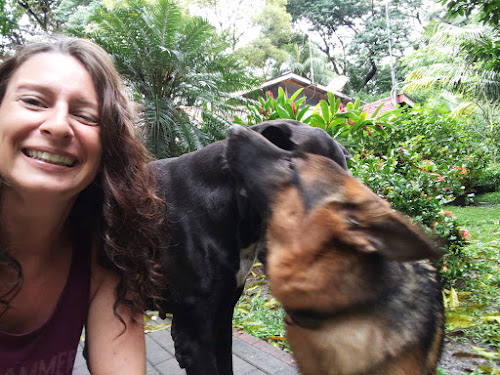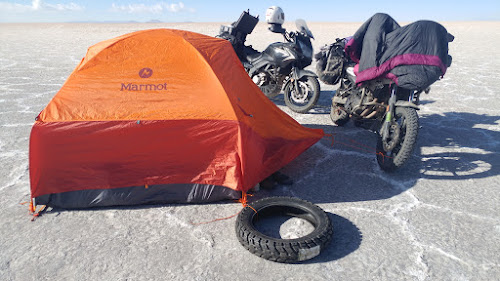 |
| Baja camping. Had the whole place to ourselves. |
I love camping. I am one of those people who actually enjoys finding some out of the way spot, throwing a tent and sleeping bag on the ground, and going to sleep with nothing to listen to but a chorus of night insects. This isn't true of everyone, and I know that it is not even true of all the men and women I know who are adventure motorcycle riders. But, for me personally, I find that a night under the stars adds to the excitement, beauty, and relaxation of a moto trip.
A Colorado Springs friend who is in the planning stages of doing his own Central and South America trip in 2018 asked me recently whether I thought camping gear would be a good thing to take. Here are some things to consider before I tell you what I think...
If one doesn't do a lot of moto camping, the truth is that camping gear takes up a good chunk of space. Of course, it all depends on how much and what type of gear one takes along, but when really planning on camping away from civilization, in more than one season, gear can take on some larger dimensions. So, then part of the decision about whether to carry camping gear or not can come down to whether a rider is comfortable maneuvering her heavily-laden bike.
Another aspect to consider, is whether a rider is comfortable with the cost of camping. Of course, when it comes to campsites vs. hotel rooms, we think of this as a no brainier--camping is cheaper. However, the front end of camping is rarely inexpensive, and I'm pretty sure that when people find themselves going the route of cheap gear, that is what they get. If a rider wants gear that will stand up to ten solid months of travel in hot, humid, cold, freezing, dry, bumpy, dusty, and muddy conditions, Coleman gear will most likely be a let down.
There are loads of articles, websites, YouTube videos etc., where riders (hikers, climbers, bicycle riders) review gear. Everyone has ideas of what works well, in what type of conditions, and at which pack size. I'm not going to go into reviewing gear here, but it's worth looking into and researching prior to buying.
Yet another consideration when deciding whether to bring camping gear is safety. I've talked a bit about safety in another post from a couple of months ago, and I will say that I still feel that we have been safe everywhere we have stayed. My CS friend who asked about the camping hosted an Argentinian friend at his house for a few days, and had a dinner party with other riders to talk about planning a trip such as this. Not long after the party, it was mentioned to me that the Argentinian friend remarked on camping being unsafe.
I was pretty shocked to hear this, to be honest.
First off, I was shocked because, as I've said, we have always felt safe. Second, from all accounts I've heard, Argentina is a country of campers. There are national parks and camping everywhere in Argentina. It is a rather expensive country to visit, and one of the more affordable ways to see a large amount of it is by camping.
At one point when asked about whether we were finding many places to camp, we compared our nights spent camping to our nights spent in hotels/hostels, and found we were about 60% camping. Later, this friend, when mentioning the safety aspect brought up by the Argentinian, said he would be curious to see if we were able to keep up the percentage of nights camping we had started with.
 |
| Camping in the pouring rain can suck! |
So, all that under consideration, here is what I think about a ten-month, multi-country moto trip that includes camping. Camping is, without a doubt, a value added aspect of this trip. We have sought out national parks in many countries we've been in--including in the states of Durango and Sinaloa in Mexico--to explore and stay in because we had gear with us. I love camping, and I love what it has added to the trip.
 |
| This campsite had power and individual sinks to wash dishes at each site. Shared bathrooms had hot water showers, but only half the toilets had toilet seats... |
The gear we are carrying is fairly bulky, but we've split it up. Each person carries his/her own personal items including Thermarest pads and sleeping bags, while we have split up the kitchen and the tent. The tent is a 3 person tent, because quite honestly, I couldn't imagine only having the room of a two-person tent for ten months--someone was probably gonna die, or at the very least, have their feelings hurt when I couldn't take the confined space anymore. When you see pictures of my bike, the Mosko Moto duffel that goes across the back of my bike has the tent, my sleeping bag--bulky as it is a -5 degree bag--and my pillow. The kitchen is in one of Josh's panniers, and what we refer to as the "feed sack"--a bag that contains food basics for lunches in the middle of nowhere and campsite dinners--lives in his top box.
The weight makes little difference when I'm riding--I really don't notice it because Camille does all the hard work. When I have to maneuver the bike at slow/no speed, yes, it is hard. But, I don't really touch the ground with both of my feet, so maneuvering a 500+ pound bike is hard whether I have the extra weight of a tent and sleeping bag or not.
We've collected a fair bit of camping equipment over the years, but there was definitely new gear we purchased specifically for this trip. The single most expensive piece was, of course, the tent. But, for this trip, between the two of us, we probably kept the cost of additional gear down to just about $506. If I were to add up the cost of all the camping gear we have brought, it is well into the $1000s. With hotels/hostels being so reasonably or even cheaply priced in all but two of the countries we've been in, I'm not sure that a brand new investment in gear would make sense for someone.
 |
| This camp setting in Panama had... |
 |
| ...this. A pool with two outdoor kitchens more beautiful than my kitchen at home. Hot showers and Wifi came with it also. |
We have safely camped in Mexico, Guatemala, Honduras, Nicaragua, Costa Rica, Panama, Colombia, Bolivia, and Chile, so far. I am writing this from Chile, so we haven't been to Argentina, Paraguay, Uruguay, or Brazil yet. We did not camp in Ecuador or Peru, but there was no specific reason for not doing so yet--I fully expect we will do so when we return later. As of last night, we have spent 48 days camping, and 57 days hotel/hostel. Though this is far from the original count of 60% camping, earlier in the trip, I need to tell you we had planned/hoped to be able to camp about 1/3 of our time on the road. We're actually doing pretty well, I'd say.
Now that we're in Chile, and moving on to Argentina, the lodging expenses are considerably higher. Considerably. Even the camping prices have gotten higher coming into Chile. But, here is the funny thing about camping in all of these countries. Most of the campgrounds/campsites we've been to have things like bathrooms which include showers (often hot),wi-fi, and power.
We haven't had wi-fi at any camping spots in Chile. In fact, when we asked at one campground where the price to camp was close to $15US per person if they had wi-fi, the girl at reception laughed and said, "No! This is camping!" But, the next night, when we pulled into a nearly full campground in Santiago's northern wine country, I stood looking at campsites which contained things such as blenders, fans, and flat-screen TVs. The people across the way from us had even brought a refrigerator. A REFRIGERATOR!!! There was still no wi-fi, but damn I had a good laugh looking around at al the comforts of home Chileans brought camping with them.
The final aspect of camping that I love, that I think makes it all worthwhile to do, is the fun people one meets when camping. Though we've had many campgrounds to ourselves due to the fact that we've been traveling in off-seasons and rainy-seasons, we are starting to share campgrounds with other people who also love the opportunity to get outside and have some fun.
 |
| If you don't like bugs, you won't like camping here... |
 |
| I you're thinking, "He looks like he's INSIDE the tent", then you are correct! And he was about 3" long... |
If you are a camper, this is definitely the way to go. Though I will warn you, if you're not, this kind of trip probably won't turn you into a happy camper. Don't like bugs? The spiders the size of my face and the tarantula will probably not win you over as "bunkmate of the year". If you're one of those campers who appreciates the QUIET beauty of nature, a campground on the weekend in a Latin-American country is NOT for you. Music is loved here, and as far as I can tell, when one person turns on music, his neighbor turns his volume up until he can no longer hear the other guy's. Then, the next neighbor down turns hers up until she can no longer hear the first two. This goes on all around the campground until all you can hear is EVERYONE'S music, and none of your own thoughts. It's just the culture here.
 |
| Look closely next to the tent door--GIANT spider. |
 |
| But, along with giant spider, this campground came with these two loves. I call that a win. |
But I wouldn't have missed it for the world! Ok, maybe that one night on the beach in northern Chile...but that's a story for a different time.






























